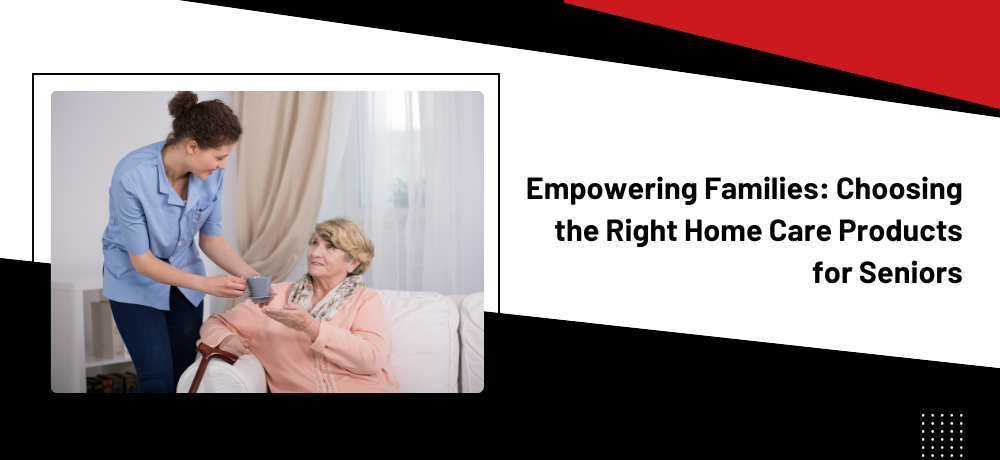As the population ages, ensuring the safety and well-being of our elderly loved ones has become a growing concern for families worldwide. With many seniors choosing to remain at home as they age, finding the right home care products is more crucial than ever. These products not only enhance the quality of life for seniors but also ease the strain on family caregivers, who often face the physical and emotional demands of caregiving. Selecting the best products tailored to an individual’s needs is key to creating a safe, supportive, and comfortable environment for both seniors and their caregivers. This guide aims to help families make informed decisions when choosing home care products that improve health, safety, and independence.
Understanding the Needs of Seniors
Before selecting any home care product, it’s essential to assess the unique needs of the elderly individual. As people age, their health and functional abilities change, which may require additional support. Common concerns for seniors include mobility challenges, cognitive decline, and the need for assistance with daily living tasks. By understanding these challenges, families can choose the right products to meet these needs and help maintain their loved ones’ independence and dignity.
Mobility and Accessibility
One of the most significant challenges for seniors is mobility. Reduced mobility can limit their ability to move safely around the house, increasing the risk of falls and injuries. Thankfully, a variety of mobility aids are available to help seniors maintain their independence while staying safe. Items like walkers, wheelchairs, and stair lifts can greatly improve mobility and prevent falls. When selecting these products, it’s important to consider the individual’s physical abilities and the layout of their home to ensure they are the best fit.
For instance, stair lifts can help those with difficulty navigating stairs, while walkers and rollators can provide support for walking long distances. These aids allow seniors to move about more easily, reducing reliance on others for everyday activities and preventing the dangerous risks associated with mobility problems.
Cognitive Support
Cognitive decline, including conditions like dementia or Alzheimer’s disease, is another common issue among seniors. To help mitigate the effects of memory loss, a range of products designed for cognitive support is available. Medication reminder systems, GPS tracking devices, and specially designed clocks can help seniors stay on track with their routines and remain safe. These tools ensure that seniors take medications on time, keep up with appointments, and retain some level of independence while minimizing the worry of forgetting essential tasks.
In addition, simple home modifications like labeled doors and organized spaces can help seniors with cognitive decline feel more in control of their surroundings, which can reduce confusion and anxiety.
Enhancing Senior Safety
Safety is a critical aspect of senior care, and many home care products are designed specifically to prevent accidents and create a secure living environment. Whether it’s bathroom safety, emergency alert systems, or home security devices, these products offer peace of mind for families and help seniors maintain a high quality of life at home.
Bathroom Safety
The bathroom is one of the most hazardous areas for seniors, with slips and falls posing significant risks. Installing grab bars near the toilet and in the shower can prevent accidents and make daily hygiene tasks easier and safer. Non-slip mats, raised toilet seats, and shower chairs are also useful additions to improve safety and comfort. These simple modifications can go a long way in making the bathroom a less dangerous place and supporting seniors in their daily routines.
Emergency Alert Systems
For seniors living alone, emergency alert systems are indispensable. These systems allow individuals to call for help with the push of a button, ensuring that help is always available when needed. Many modern systems now come equipped with features like fall detection, GPS tracking, and two-way communication, which provide extra layers of safety. With these devices, family members can rest assured that their loved one has the means to summon help quickly in case of an emergency.
Supporting Family Caregivers
Family caregivers often take on the physical, emotional, and logistical responsibilities of caring for an elderly loved one. These tasks can be overwhelming, especially without the right tools. Fortunately, home care products also exist to ease the burden on caregivers by saving time and reducing stress.
Time-Saving Devices
Automated devices such as medication dispensers and robotic vacuum cleaners can save caregivers time and help ensure that daily tasks are carried out efficiently. For instance, medication dispensers can automatically sort and dispense pills, preventing missed doses and reducing the need for constant supervision. Similarly, robotic vacuum cleaners and automated home appliances can assist with household chores, giving caregivers more time to focus on providing personalized care.
Mental and Emotional Health Support
Caregiving can be emotionally draining, and without proper support, caregivers are at risk of burnout. Providing mental health resources for caregivers, such as counseling services or support groups, can help them manage stress and prevent burnout. Additionally, respite care services, which provide temporary relief by offering professional care for seniors, allow caregivers to take a break and recharge.
By using the right home care products and resources, family caregivers can manage their responsibilities more effectively and maintain a healthier work-life balance.
Technology and Innovation in Home Care
Technological advancements have transformed home care in recent years. Smart home devices, like voice-activated assistants, can help seniors manage daily tasks, set reminders, and control household appliances, reducing their dependence on others. For seniors with limited mobility or cognitive impairments, these devices are invaluable tools for maintaining independence.
Telehealth services, which allow seniors to consult with healthcare providers remotely, are another innovation that has made home care more accessible. This service reduces the need for travel and provides timely medical advice from the comfort of home. Additionally, wearable health monitors that track vital signs like heart rate and blood pressure can alert caregivers or healthcare providers if there are any concerning changes, ensuring timely intervention.
Choosing the Right Home Care Products
Selecting the right home care products can feel overwhelming with so many options on the market. To make the best choice, families should focus on the specific needs of the senior in question. Factors like ease of use, cost, durability, and compatibility with existing systems are all essential to consider. Additionally, consulting healthcare professionals or home care experts can provide valuable guidance on the most suitable products for an individual’s situation.
Promoting Independence and Enhancing Quality of Life
The ultimate goal of home care products is to help seniors maintain their independence and live as comfortably and safely as possible. By providing the necessary tools and support, these products empower seniors to live with dignity and confidence, reducing their reliance on others for daily activities. For families, this offers peace of mind, knowing that their loved ones are cared for in a safe and supportive environment.
Encouraging seniors to be involved in the selection of their care products can also help them feel more in control and ensure that their preferences are taken into account. This collaborative approach often leads to better outcomes and greater satisfaction for both the senior and their caregivers.
Final Thoughts
Choosing the right home care products is an important step in ensuring that seniors receive the care and support they need to live independently and safely. By carefully considering their unique needs, families can find solutions that promote comfort, safety, and overall well-being. With the right tools, family caregivers can also manage their responsibilities with less stress and greater effectiveness.



